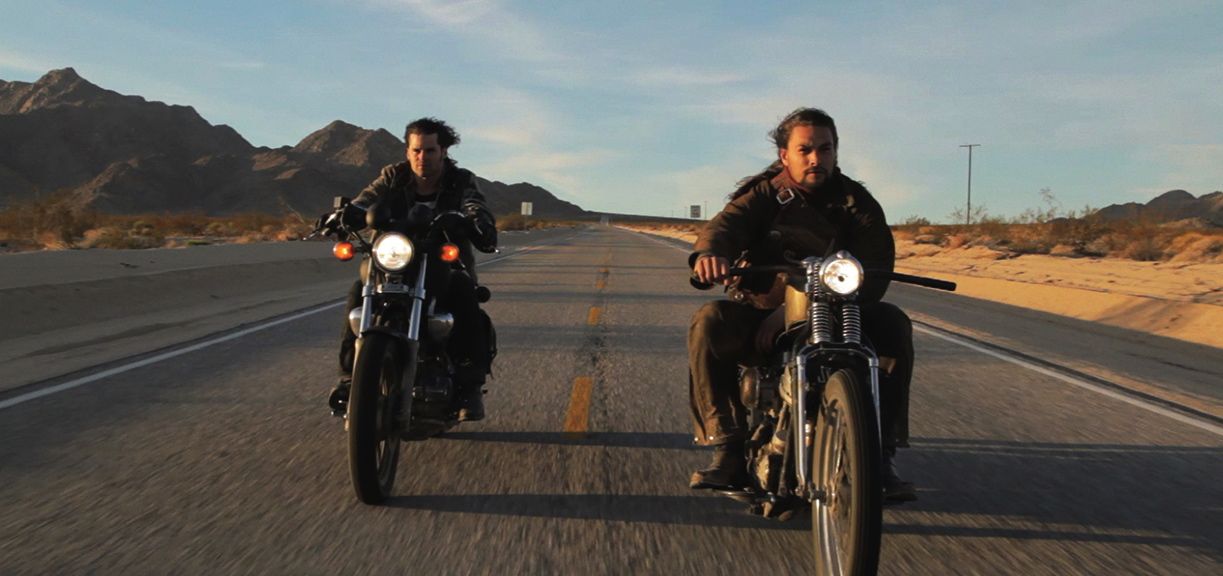
Road to Paloma is the directorial debut of Jason Mamoa, most known for his role as Khal Drogo in Game of Thrones, as well as key roles in Stargate: Atlantis and the recent Conan the Barbarian reboot, who also stars, co-writes and co-produces the film, distributed by Anchor Bay in collaboration with WWE Films. Suffice to say, the film comes from a peculiar pedigree 1. Exactly what attracted the latter studio to this project – a slow-burn, meditative film, miles away from their usual fare of high-octane genre vehicles for their own stars like John Cena – isn’t clear, aside from the fact that the enormous, charismatic Mamoa wouldn’t look out of place in a WWE ring. What we’re given is a film better than probably anyone expected, refreshing in a lot of ways, even if the end result isn’t particularly satisfying. Mamoa demonstrates some good directorial instincts, but the sparse, vaguely drawn narrative elements of the film ultimately undo any real tension or investment in the film.
Mamoa plays Robert Wolf, an American-Indian from the Mojave tribe on the run from the law, who forms an unlikely friendship with down-and-out musician Irish (Michael Raymond-James). The reveal of what he’s running from isn’t given to us until late in the film, but it’s all but spelled out for us in clues given by Wolf’s policeman father (it’s also on most blurbs and reviews of the film) which deflates much of the narrative’s power. There really isn’t much more to the film – Wolf constantly being tracked down by two Federal agents who by the end turn to increasingly cartoonish means of interrogation and manipulation to find him. In addition, the characters are so vaguely drawn meaning that in a film that is by design low on dialogue, we don’t learn a whole lot about our two characters beyond broad archetypes – we have an early scene of Irish drunk and starting fights, establishing him within the self-destructive musician trope that he doesn’t get a chance to escape from. For Wolf, there is a scene where the two travellers discover they’ve eaten at a diner and have no money to pay, and Wolf insists they work off the debt, cleaning dishes in the kitchen while Irish mouths off at the owner and slacks off. It’s an easy way of establishing a correct moral compass for Wolf with which the later revelations about his past can be weighed against. In any case, the lack of genuine character makes it difficult to develop genuine empathy toward the characters.
What Mamoa is more interested in is visual style and iconography, and there’s a lot of promise from the debut director. Ostensibly a Western with an important ethnographic twist, Mamoa captures a real sense of time and place of a slower, meditative Western close to something like Clint Eastwood’s The Outlaw Josey Wales. Shooting in a particularly wide aspect ratio of 2.40:1, Mamoa develops with DP Brian Andrew Mendoza 2 a very good sense of composition. A key gripe that I have that I can’t help bringing up in reviews is the modern use of widescreen, too often used as little more than a marker of prestige and to no real effect, and often unsuited to the subject matter. It’s refreshing to have a film as visually assured as this in the format. There’s stunning desert cinematography throughout 3 that echoes a lot of the film’s ideas. Wolf is continually contextualised in the expansive land, emphasising not just his own ancestry’s connection with the land, but the sense of lateral movement as he evades his pursuers, who on the other hand are continually shot in more claustrophobic mid-range and close-up scenes, a nice juxtaposition that visually suggests their own incompatibility with the land compared with Wolf’s comfort on the open plains. Occasionally Mamoa retreads visual material, such as the continual Easy Rider influenced motorcycles-on-highway scenes set to music, and the confessions-by-campfire is one Western trope I could stand to see extinguished, but as a whole his instincts are suited to this type of film, far more thoughtful and considered than the marketing might suggest, and conceals the film’s mere $600 000 budget.
The rigidity of our rating system puts a film like Road to Paloma in a difficult spot. It shows a lot of promise from the director whose future projects I’d seek out. Mamoa’s profile seems to be set to rise, having signed on as Aquaman in a future DC films project, and I’d hope this film makes enough back off its modest budget for him to be given the reigns to helm future projects. Paloma is ultimately held back by insufficient character or narrative to give the sparse, meditative film any real propulsion and though there seems to be some ideas behind the film – the inability of Western civil authorities to maintain law over the drastically different reservation communities, for one – this pretty picture doesn’t offer enough to support its obvious merits. However, fans of Mamoa or even modern Westerns could do a lot a worse than picking up Anchor Bay’s Blu-ray.
